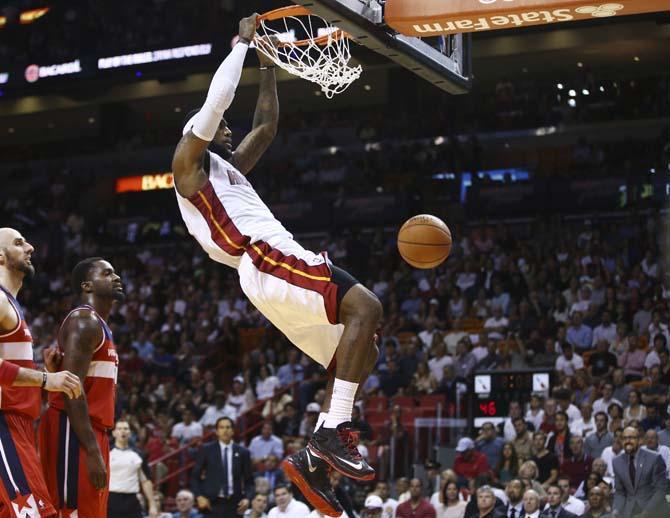Name me three players on Wichita State’s record-tying 34-0 team.
I’ll wait.
Can’t do it?
Now try to name three players on any NBA starting lineup. A lot easier, right?
That’s just one of the many reasons the NBA Playoffs are better than March Madness.
I understand the one-and-done nature of the tournament makes for drama-filled nights and plenty of upsets to go around, but the quality of basketball pales in comparison to its NBA counterpart.
NBA D-League rosters are filled with countless college stars who shined at college basketball’s biggest stage in March, yet can’t even crack an NBA bench.
Doug McDermott, meet Jimmer Fredette, y’all are probably going to be great friends sitting on the bench for the Idaho Stampede in the D-League one day.
For true basketball fans, the complexity of NBA offensive systems and defensive strategies trumps the “magic” of senior-laden, average talent mid-majors upsetting more talented, freshman-filled teams with actual NBA-ready players.
If Andrew Wiggins, Jabari Parker or Julius Randle struggle in the tournament and get knocked out in the early rounds, it won’t be because their games won’t translate to the NBA — though I’m sure some “experts” will make that very case — it’ll be because their inexperience at the biggest stage failed them.
And don’t give me the “NBA teams don’t play defense” argument. If Jim Boeheim could design a 2-3 zone that could stop LeBron James, he’d be coaching in the NBA, not routinely getting routed in the early rounds by teams with more than a few days to watch film.
The defenses in the NBA have to be good in order to stop the increasingly complex offenses. While watching the Hawks, you might see Kyle Korver run off three different screens and pop out beyond the 3-point line, all to set up some other action for Paul Millsap on the opposite side of the court.
Which brings me to my next point: the best team rarely gets to cut down the net when it’s all said and done.
The single-elimination format punishes more talented teams, and allows the “hot” team a chance to do the seemingly impossible.
No doubt that leads to excitement — Lehigh’s upset of Duke in last season’s tournament comes to mind — it also leads to overmatched teams putting on stink-fests in the later rounds — think of the atrocious 2011 Championship game where Butler shot 18 percent from the field.
Rather than reward fluke performances, the NBA puts its postseason teams through a gauntlet. Winning four seven-game series in a row requires some combination of skill, endurance and luck, with skill and endurance making up most of the equation.
At any point in the 2013 Eastern Conference Finals, you could’ve convinced me the Heat or the Pacers had the upperhand, but both teams had the chance to take each other’s best punch and respond.
Take that same 2011 Championship game featuring Butler and Connecticut and make it a seven-game series, and maybe Butler goes home with a championship. Maybe they get swept, but at least we’d know one terrible shooting night didn’t determine who gets to call themselves champions.
The argument that March Madness is inherently more exciting than the NBA playoffs is greatly overblown as well.
I’ll take Ray Allen backpedalling to the corner and shooting a dagger right through San Antonio’s heart, or Reggie Miller scoring nine points in six seconds forever giving him the upperhand in his battles with Spike Lee in Madison Square Garden.
Even when an overmatched team does make it to the finals, a la the 76ers in 2001 facing a stacked Lakers squad, the skill of individual players can elevate what would normally be a boring showdown. I distinctly remember Allen Iverson single-handedly willing that 76ers team to an overtime victory in game one.
Yeah, Shaquille O’Neal, Kobe Bryant and the rest of the Lakers wiped the floor with the 76ers in the next four games, but the thought that A.I. could potentially take over a game was always in the back of my head.
So while the rest of nation will be sitting in front of their televisions at the kids table watching the likes of North Dakota State take on Oklahoma, I’ll be at the grown-ups table waiting for the real fun to start in April.
Trey Labat is a 21-year-old history senior from Mandeville, La.
Opinion: NBA Playoffs better than March Madness
By Trey Labat
March 20, 2014
Washington Wizards players Marcin Gortat (4) and Martell Webster (9) watch as Miami Heat’s LeBron James (6) dunks during the first half of an NBA basketball game in Miami, Monday, March 10, 2014. (AP Photo/J Pat Carter)
More to Discover


